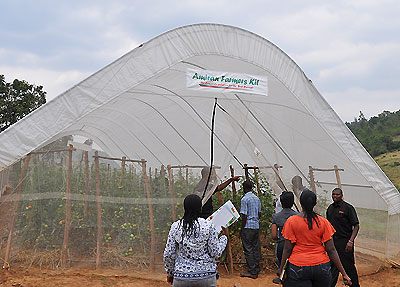With traditional types of farming, other factors left constant, the size of land on which a farmer carries out their activities determines the size of the harvest. In many cases, these farmers are extremely vulnerable to natural factors that might affect their yields; it doesn’t matter whether they subsistence or large-scale farmers. Their issues are the same. Government encourages land consolidation and crop intensification for small-scale farmers. This will enable farmers to come together or combine their efforts both physical and material. Along with this, Government came up with the mechanisation strategy, so that farmers could use machines to improve crop yields.


With traditional types of farming, other factors left constant, the size of land on which a farmer carries out their activities determines the size of the harvest. In many cases, these farmers are extremely vulnerable to natural factors that might affect their yields; it doesn’t matter whether they subsistence or large-scale farmers. Their issues are the same. Government encourages land consolidation and crop intensification for small-scale farmers. This will enable farmers to come together or combine their efforts both physical and material. Along with this, Government came up with the mechanisation strategy, so that farmers could use machines to improve crop yields. "As farmers in the area, we put together 35 hectares of land and we harvested 100 tonnes of maize during our first harvest. Given the size of our harvest, we were linked to business people who bought our produce at a good price,” said Silas Balinda, a farmer in Kicukiro District. He attributes the good harvest to the use of advanced technology in their farming. "Based on the size of land we cultivate, if we do not use tractors and other related machines, it is impossible to plant and harvest on time,” he said. The farmer is well aware of the negative impact of planting late. He says that unlike before, farmers in the district are now respecting standard measures in agriculture with the help of local authorities and Rwanda Agriculture Board (RAB). Embracing modern agricultural practices not only improves farm production but also builds farmers’ capacities to fight against dependency on the vagaries of nature. Food production by small scale farmers has greatly improved and this is attributed to use of modern techniques, according to a report by Concern Worldwide and the Institute for Policy Analysis and Research (IPAR). Titled ‘Farming for Impact’, the report is based on the previous programme that saw small scale farmers in the Southern and Northern provinces equipped with modern farming skills. The report indicates that increase in food production among the farmers involved in the programme stands at 96 per cent. Among other measures taken showed that farmers’ use of fertilisers increased to 30 kilogrammes per hectare annually, from 6 kilogrammes. Modern technology use in agriculture has taken all dimensions, without leaving vegetable growers behind. Farmers who spoke to The New Times say that, although some modern measures tend to be expensive in the short run, they were worth investing in. "When you invest in farming there are measures that we, as farmers, must take despite the cost. We must consider our future expectations,” said Laurent Hakizimana, a tomato farmer in Kicukiro District. Hakiziman is one of the few farmers who have taken on the Amiran Farmers Kit (AFK) technology. AFK is a greenhouse farming project that enables farmers, using small plots, to maximise their crop production. Each kit costs Rwf2.2 millionBolton Rwanda, a subsidiary of a British firm with 50 years of experience in agribusiness, trains farmers, teaching them the best ways to manage their crops, as well as marketing strategies. The Kit provides farmers with a simple-to-use drip irrigation system, a greenhouse, quality seeds, chemicals and fertilisers among others. "After acquiring all the necessary equipment, I no longer depend on rain water to have a good harvest. I irrigate my small garden and most important of all my tomatoes are not exposed to direct sunshine,” Hakizimana said. He explained that his growing season depends on when he plants and the time it takes for his tomatoes to get ready. "I can plant any time unlike before when I had to wait for the rainy season. This has greatly increased what I earn from farming,” he said. Farmers who are using the kit said they are harvesting 4,000kgs of tomatoes from an 8m x 15m greenhouse. Hakizimana sells his tomatoes at Rwf 500 per kilogramme. Bob Gatera, the Country Manager of Bolton Rwanda, said the project, which begun in 2011, has handed over 100 kits to farmers. "It is possible for small scale farmers to produce and earn more than expected. But this is determined by the appropriate measures taken in making their land more productive,” said Gatera. He explained that the technology is a solution for small scale farmers wanting to enter commercial production.Balton’s head of agriculture, Kelvin Odoobo, says the programme will not only help farmers modernise their farming but will also enable small scale farmers to effectively contribute towards food security.


